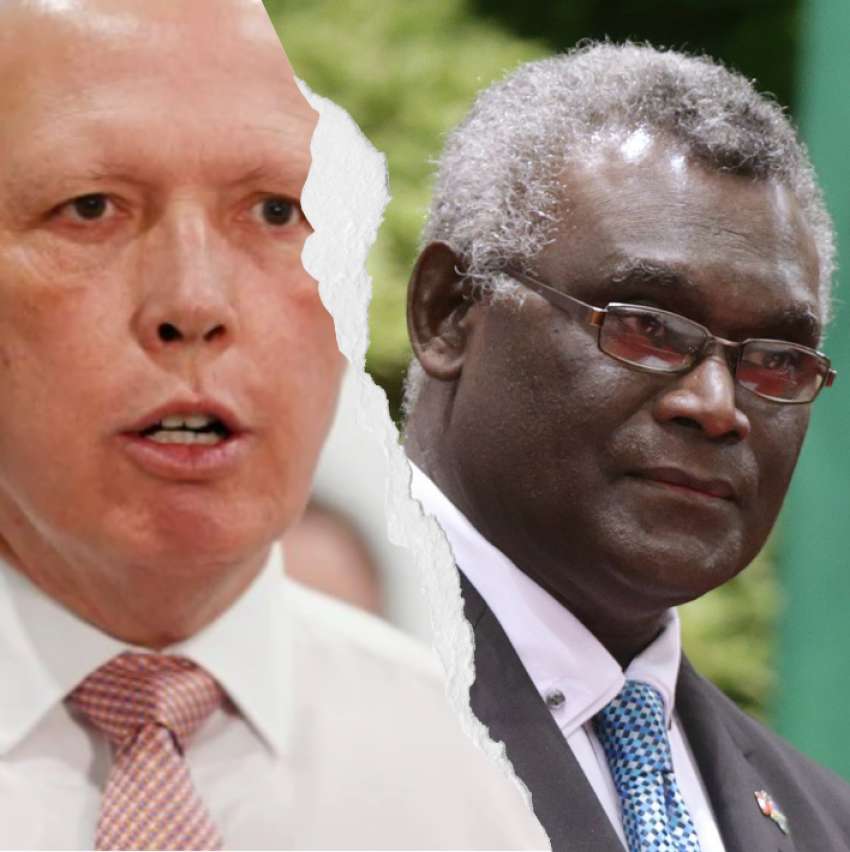
The decision by the Solomon Islands to sign a security arrangement with China, coming on the eve of Australia’s most holy of all holy days, ANZAC Day, turned the federal election campaign into a national security campaign.
The major parties quickly vied to prove their militaristic and pro-United States alliance credentials. Defence minister Peter Dutton’s “If you want peace, prepare for war” speech was a difficult one to top, but Labor stepped up. So many words have now been spoken that it is not necessary to prove a threat to national security exists and that this election should not take on a khaki hue.
Dutton’s speech was designed to engender fear, where none is needed. A careful manipulation of opinion over the last few years has led to a steep rise in anti-China sentiment. The conservatives think Australians have been suitably prepared for a further round of militarisation and warmongering.
The Minster’s choice of words is interesting from an historical point of view. The phrase was first used in Rome about 380 before common era. It was later adapted by Emperor Hadrian to become “peace through strength or failing that through threat”.
But Dutton’s outburst has a more recent and more frightening echo: it mirrors the words of Elbridge A Colby, architect of the Pentagon’s new military doctrine.
Colby infamously stated that if we want peace then we must prepare for nuclear war. Australia’s military budget has now jumped to 2% of GDP and there are serious calls for this to be doubled to an economically crippling 4%!
Facing an insecure future with rising inflation and low wages, people are understandably fearful about which services will be cut by this theft. The people of the Pacific nations threatened by climate inaction can also imagine where those dollars would be better spent.
Morrison, in his ANZAC Day speech, repeated his earlier “arc of autocracy” remarks about how “from Beijing to Moscow is challenging the rules-based world order our grandparents’ generation sought to secure”.
Dutton has likened the situation to that of the 1930s. Morrison fulminated about there being a red line crossed if China is allowed to set up a naval base in the Solomon Islands. The corporate media’s has been happily hyping this with headlines about “existential threats”.
Morrison borrowed the “red line” reference from Kurt Campbell, US National Security Council Indo-Pacific Coordinator, who used it the day before by.
Campbell and Morrison have also turned their gaze to Papua New Guinea with a view to boosting “security” arrangements there.
Any pretence that Labor offered anything better was soon dispelled. Albanese’s speech to the Lowy Institute in March, a reply to Morrison’s announcement that the Coalition would boost military spending, could have simply been a text message saying “me too”.
Morrison and Dutton’s intemperate language was deliberate and has framed this election campaign based on national security. Penny Wong, Labor’s shadow foreign minister, was quick to attack them — for not being fast enough to stop the Solomon Islands from signing a security pact with China. She accused Canberra of “dropping the ball” — the ball that keeps the Solomon Islands subdued by aid.
It is because Canberra has treated Pacific neighbours so poorly, ignoring their calls to cut emissions, that some Pacific states have become distrustful. They have appealed time and again for Australia to cut greenhouse emissions and have been rebuffed.
At the Pacific Islands forum in Tuvalu in 2019, Australia ignored calls to phase out the use of coal. Its pattern of behaviour — the strong seeking to dominate the weak — marks out global capitalist politics. Aid is offered but altruism is never a motivation. Strings are inevitably attached.
Australia’s decision to bully Manasseh Sogavare government for making a deal with China follows its approach on the existential matter of rising seas as a result of climate change. This is the real security issue, but paternalism remains the order of the day.
Wong and others have said, hyperbolically, that the Solomon Islands decision to enter an arrangement with another sovereign state, as Australia’s greatest foreign affairs disaster since the end of World War II. Labor has said it would “re-invigorate relations” with countries in the region, including the establishment of a military training school. Aid and foreign worker arrangements are also under discussion. How to combat the climate emergency has again been sidelined.